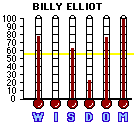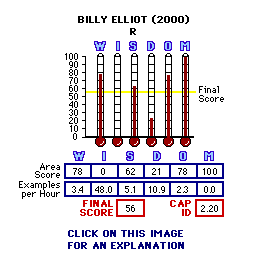Click on CAPCon Alert
image for explanation
A service to parents and grandparents
MAR20122
Billy Elliot (2000), (R)
CAP Score: 56
CAP Influence Density: 2.20

Click on CAPCon Alert image for explanation |
A service to parents and grandparents MAR20122 Billy Elliot (2000), (R) CAP Score: 56 CAP Influence Density: 2.20 |
 |
with your The foul language eliminator Removes profanity from movies and TV shows Switch to LifeLine for Christian long distance service The Family Friendly  Internet Service SPECIAL OFFER  From the best-seller book series. NOW ONLY Just in time for Christmas! Comments?  Christian Media News  A Singles Christian Network  Your One Stop  For Everything Christian Free Email Ministry  Subscribe Today!! |
 Christian Banner eXchange For FREE text-only versions of our media analysis reports as they are calculated, open this email then click "send." If your browser does not handle this URL format properly, send us a request to add you.
SUMMARY / COMMENTARY: TITLE (RATING) -- COMMENT *BILLY ELLIOT* (R) -- mathematically equivalent to very hardcore R in language. In the enewsletter announcing to our subscribers this analysis of *Billy Elliot*, I roasted Roger Ebert for saying: "Note: Once again, we are confronted by a movie that might be ideal for teenagers near Billy Elliot's age, but has been slapped with the R rating. While kids will gladly sneak into R-rated movies they hope will be violent or scary, the R barrier only discourages them from films that could be helpful or educational. In the case of "Billy Elliot," the movie contains only mild violence and essentially no sex, and the R is explained entirely by the language, particularly the "[the most foul of the foul words]." The filmmakers believe that is a word much used by British coal miners, and I am sure they are correct. There are two solutions to the linkage of the [the most foul of the foul words] and the R rating: 1). The MPAA should concede the melancholy fact that every teenager has heard this and most other nasty words thousands of times, or 2). Filmmakers should sacrifice the [the most foul of the foul words] in order to make their films more available to those under 17." Well, Ebert was right about the rating but for the wrong reasons. While *Billy Elliot* is most assuredly mathematically equivalent to very hardcore R in language (that investigation area score was *zero*), the overall magnitude or the "big picture" was mathematically equivalent to a PG-13. A "hardcore" PG-13 but PG-13 nonetheless. Movies rated R in the CAP comparative baseline database of movies earned scores of 54 and below. PG-13 movies earned from 55 to 67. The *Billy Elliot* Final Score of 56 lies right there at the bottom of that scoring cell but inside it just the same. Enough of the "engineering." The CAP Thermometers in the Findings/Scoring section will make the distribution of investigation area scores obvious. For the benefit of our webpage visitors I will repeat the discussion I shared with our subscribers regarding Ebert's rationale. Each week, nearly twice as many under 17 than adults see movies. Ebert claims "...every teenager has heard [the most foul of the foul words] and most other nasty words thousands of times..." Since so many of our kids see so many movies, almost all of which over PG present a ton of foul language, it is no wonder why so many kids use such language [1 Cor. 15:33]. Is hearing such language at school [which, extended, means school kids use it] supposed to excuse hearing it as and in entertainment? Does that "reality" in the schoolyard and hallways absolve us of the accountability for willfully exposing our kids to more of it in and as entertainment [Luke 17:2]? Is this an example of the dangerous rationale which suggests once a sin has been committed, that the second time, third time.....thousandth time are not sinful or are any less sinful? Does such rationale say that becoming a teenager dissolves the sin of such language? Regarding Mr. Ebert's comment about "...the R barrier only discourages them from films that could be helpful or educational." [Isa. 5:20] I would like to ask him a few questions. In which sin did Jesus either participate or encourage participation to teach us of it? Put differently, in which sin would Jesus want us to participate to learn of it, or which sin would He want us to demonstrate for others so they may learn of it? To add perspective regarding the issue of exposing our kids to sinful programming, which behavior is sinful for a child but is not sinful for an adult? Note that "legal" is not part of the question. Enough. To the storyline. This is a story of Billy Elliot (Jamie Bell), an active 11 year old British lad who discovers he has a propensity for dance. But dad wanted him to participate in more "manly" activities such as boxing. While in the gym getting his ears boxed, Billy notices with much interest the cloud of tutus floating about at the opposite end of the gym. By comparing the two vocations, boxing and dancing, Billy discovers his heart is in dancing. His dad, Chuckie (Gary Lewis) and his brother Tony (Jamie Draven), both striking British coal miners, are "macho" (or "redneck"?) and don't believe Billy should be messing with ballet because it is "homosexual." In the beginning, dad and Tony oppose Billy's dreams with slander and ridicule, even bitter verbal lashings [Eph. 6:4]. Billy's dad pays 50 tuppence per lesson for boxing lessons for Billy, but Billy ends up sneaking to ballet classes with Mrs. Wilkinson (Julie Walters) [Isa. 5:18]. The rest of the story follows Billy through the battles to get his family to accept that he is a dancer, not a boxer. Slowly, they "come around" and even support Billy to the point of self-sacrifice to enable Billy to realize his dream. And ultimately, Billy becomes an accomplished dance artist in ballet. But at what cost? While there is nothing wrong with a young son wanting to learn ballet instead of boxing, there is a great deal wrong with defying his father [1 Sam. 15:23, Is. 30:1]. There is no justification in the Bible I can find for a son (or daughter) defying and rebelling against his/her father (or mother) [Gal. 4:2, Prov. 10:1]. Indeed, there is strong admonition against such rebellion and defiance [Heb. 13:17, Prov. 6:20]. The movie seems to try to justify "How else could Billy have gotten through to his father?" The writers even had Billy's dance teacher, Mrs. Wilkinson invading to the Elliot home and reading the riot act to dad and Tony. While I am certain some cases sons would be righteous in arguing with abusive fathers, to present such as carefully crafted and "justified" entertainment is dangerous. From our home page: "PERSPECTIVE: We have been so drugged by vulgar extremes that what once was morally unacceptable has become morally invisible." Remember what God has told us in 1 Cor. 15:33 "Do not be misled: Bad company [or evil communications] corrupts good character [good manners]." The "bad company" imagery (communications) in such programming may deceive embittered and under-experienced youth and be the only communication captured by them. There may be many emotional and social filters and barriers in the observer in the path of such imagery on its way to the brain that by the time the imagery gets to the brain all that remains of the original imagery is a picture of manipulating dad with deceit and arrogance [Prov. 8:13]. And there is a great deal wrong with what seems to be equating ballet with homosexuality in this yet another portrayal of homosexuality as a normal and viable option for personal sexuality, especially in the way the writers did it [1Cor. 6:9-10]. Michael (Stuart Wells), one of Billy's best friends, was gay. On a cold night following an episode of the fire of feeling rejected by his family -- prime conditions for experimentation when coached and encouraged by the unconditional acceptance of sin [James 1:12-16], Michael took Billy's cold hands and placed them inside his coat against his midsection to warm them. While Billy balked about it, Michael said "I rather enjoy it" and kissed Billy's cheek. Fortunately, Billy did not reciprocate, at least not openly. But later, as Billy was leaving for the dance school, he kissed Michael's cheek goodbye, as if Billy was saying "It's okay that you are homosexual." As brutal as that previous sentence sounds to modern morality, while we must love the sinner and do what we can to help him/her break the bondage to sin (even our own), we must NOT accept sin. Even as God hates sin [Prov 6:16-19], so must we also hate sin, just not the sinner. Young Michael appeared to have been a product of authority-figure example, i.e., his father's cross-dressing. Michael did it, too. And Michael ended up homosexual (an *excellent* application of the warning in Luke 17:2). And therein lies a good example of "How Did They Do It": an example of those in the victim's circle of influence causing the sin. If there is a "lesson" in this movie, maybe it is more for the parents than for teenagers. That "lesson" may be for parents to more closely evaluate the dreams and aspirations of their children: to investigate misgivings about a vocation before giving judgment. As a single item of interest, Jamie Bell does a very good job in the dance routines and I would not be surprised if he capitalizes on that talent in the years ahead. Maybe he should. He is good. In addition to the foul language and the portrayal of homosexual matters, *Billy Elliot* also presented dad hitting his son with his fist, several episodes of adolescent hate talk toward dad, and a non-parent adult encouraging rebellion against a father's wishes. In one case, Mrs. Wilkinson was feeling the inside of Billy's upper leg in a questionable manner, adolescents speaking of parents' sex lives, and adolescent drinking. Further, Billy hits another male ballet dancer with his fist, there is tons of smoking, and rear male nudity. The listing in the Findings/Scoring section from Full Report below provides a complete accounting of this movie. As always, it is best to refer to the Findings/Scoring section -- the heart of the CAP analysis model -- for the most complete assessment possible of this movie. FINDINGS / SCORING: 
NOTE: Multiple occurrences of each item described below may be likely, definitely when plural. Wanton Violence/Crime (W): Impudence/Hate (I)(1): Sex/Homosexuality (S): Drugs/Alcohol (D): Offense to God (O)(2): Murder/Suicide (M)(3):  |